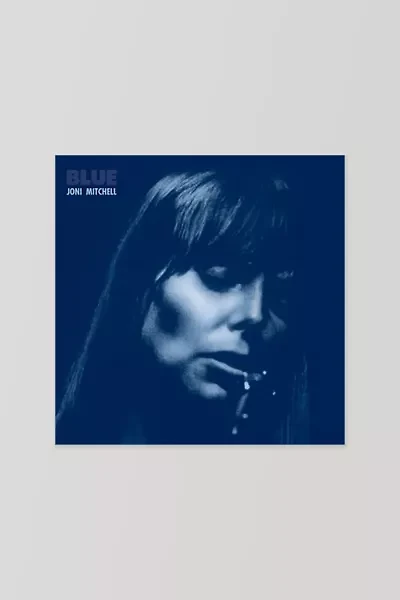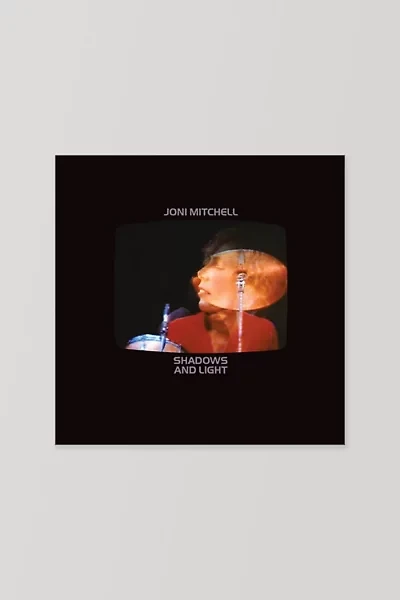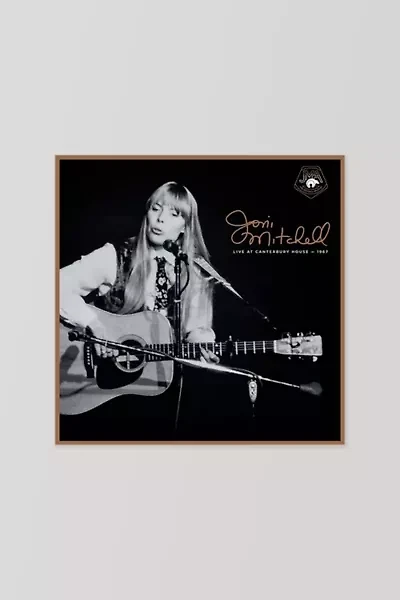Home
Joni Mitchell Archives, Vol. 3: The Asylum Years (1972-1975)
Barnes and Noble
Loading Inventory...
Joni Mitchell Archives, Vol. 3: The Asylum Years (1972-1975)
Current price: $59.99

Barnes and Noble
Joni Mitchell Archives, Vol. 3: The Asylum Years (1972-1975)
Current price: $59.99
Loading Inventory...
Size: CD
*Product information may vary - to confirm product availability, pricing, shipping and return information please contact Barnes and Noble
The third volume in
Joni Mitchell
's ongoing Archives series covers her especially transformative phase between 1972 and 1975, when she was shedding some of her folk background and venturing into territory simultaneously more accessible and more unprecedented. This fruitful era produced the soul-searching soft rock of 1972's
For the Roses
, the 1974 pop breakthrough
Court and Spark
, and 1975's pivot to more experimental, jazz-influenced songwriting on
The Hissing of Summer Lawns
. As with previous volumes of the series,
Archives, Vol. 3: The Asylum Years (1972-1975)
offers an exhaustively complete window into
Mitchell
's creative process from its particular era, this time with 96 tracks that include previously unshared demos, alternate studio versions, live performances from the time, and the like. Impressively, the collection begins with early versions of two
tunes cut at an impromptu 1971 studio session with
David Crosby
and
Graham Nash
. These stripped-down versions of "Cold Blue Steel and Sweet Fire" and "For the Roses" are even more intimate than the album versions, highlighting the urgency and passion in
's voice and lyrics. A series of
demos played on piano are similarly effective, clearing away everything except the rawest components of the songwriting. Amid an abundance of fairly standard concert recordings and alternate versions of album tracks, this volume of
Archives
includes some of the most interesting
artifacts of the series up until this point. Among them are especially otherworldly demos of
Summer Lawns
tracks such as "In France They Kiss on Main Street," most of them with the liquid jazz instrumentation of the album boiled away, leaving just
's bright acoustic guitars and several layers of self-harmonizing vocals. In addition to some curious collaborations with
James Taylor
, the compilation includes multiple tracks made with
Neil Young
and different versions of his backing bands. An especially loose and rambling take on
's first Top 40 hit, "You Turn Me On, I'm a Radio," plays up the country undercurrents that got smoothed out in its official version, but it's a version of
's "Raised on Robbery" recorded during the same sessions that gave birth to
Young
's depraved masterpiece
Tonight's the Night
that's especially head-turning. If the
version aimed for rip-roaring excitement, this performance peels away all of the polish and production, rocking out in a gloriously unhinged way that transposes the song's inherent fun into a reckless euphoria.
's powers as a songwriter and creative spirit are unparalleled at every step of her journey, but her output in the '70s was on a higher plane, even for her.
Archives, Vol. 3
reflects this with behind-the-scenes material just as storied and worthy as the music that
was making during one of her finest hours. ~ Fred Thomas
Joni Mitchell
's ongoing Archives series covers her especially transformative phase between 1972 and 1975, when she was shedding some of her folk background and venturing into territory simultaneously more accessible and more unprecedented. This fruitful era produced the soul-searching soft rock of 1972's
For the Roses
, the 1974 pop breakthrough
Court and Spark
, and 1975's pivot to more experimental, jazz-influenced songwriting on
The Hissing of Summer Lawns
. As with previous volumes of the series,
Archives, Vol. 3: The Asylum Years (1972-1975)
offers an exhaustively complete window into
Mitchell
's creative process from its particular era, this time with 96 tracks that include previously unshared demos, alternate studio versions, live performances from the time, and the like. Impressively, the collection begins with early versions of two
tunes cut at an impromptu 1971 studio session with
David Crosby
and
Graham Nash
. These stripped-down versions of "Cold Blue Steel and Sweet Fire" and "For the Roses" are even more intimate than the album versions, highlighting the urgency and passion in
's voice and lyrics. A series of
demos played on piano are similarly effective, clearing away everything except the rawest components of the songwriting. Amid an abundance of fairly standard concert recordings and alternate versions of album tracks, this volume of
Archives
includes some of the most interesting
artifacts of the series up until this point. Among them are especially otherworldly demos of
Summer Lawns
tracks such as "In France They Kiss on Main Street," most of them with the liquid jazz instrumentation of the album boiled away, leaving just
's bright acoustic guitars and several layers of self-harmonizing vocals. In addition to some curious collaborations with
James Taylor
, the compilation includes multiple tracks made with
Neil Young
and different versions of his backing bands. An especially loose and rambling take on
's first Top 40 hit, "You Turn Me On, I'm a Radio," plays up the country undercurrents that got smoothed out in its official version, but it's a version of
's "Raised on Robbery" recorded during the same sessions that gave birth to
Young
's depraved masterpiece
Tonight's the Night
that's especially head-turning. If the
version aimed for rip-roaring excitement, this performance peels away all of the polish and production, rocking out in a gloriously unhinged way that transposes the song's inherent fun into a reckless euphoria.
's powers as a songwriter and creative spirit are unparalleled at every step of her journey, but her output in the '70s was on a higher plane, even for her.
Archives, Vol. 3
reflects this with behind-the-scenes material just as storied and worthy as the music that
was making during one of her finest hours. ~ Fred Thomas
The third volume in
Joni Mitchell
's ongoing Archives series covers her especially transformative phase between 1972 and 1975, when she was shedding some of her folk background and venturing into territory simultaneously more accessible and more unprecedented. This fruitful era produced the soul-searching soft rock of 1972's
For the Roses
, the 1974 pop breakthrough
Court and Spark
, and 1975's pivot to more experimental, jazz-influenced songwriting on
The Hissing of Summer Lawns
. As with previous volumes of the series,
Archives, Vol. 3: The Asylum Years (1972-1975)
offers an exhaustively complete window into
Mitchell
's creative process from its particular era, this time with 96 tracks that include previously unshared demos, alternate studio versions, live performances from the time, and the like. Impressively, the collection begins with early versions of two
tunes cut at an impromptu 1971 studio session with
David Crosby
and
Graham Nash
. These stripped-down versions of "Cold Blue Steel and Sweet Fire" and "For the Roses" are even more intimate than the album versions, highlighting the urgency and passion in
's voice and lyrics. A series of
demos played on piano are similarly effective, clearing away everything except the rawest components of the songwriting. Amid an abundance of fairly standard concert recordings and alternate versions of album tracks, this volume of
Archives
includes some of the most interesting
artifacts of the series up until this point. Among them are especially otherworldly demos of
Summer Lawns
tracks such as "In France They Kiss on Main Street," most of them with the liquid jazz instrumentation of the album boiled away, leaving just
's bright acoustic guitars and several layers of self-harmonizing vocals. In addition to some curious collaborations with
James Taylor
, the compilation includes multiple tracks made with
Neil Young
and different versions of his backing bands. An especially loose and rambling take on
's first Top 40 hit, "You Turn Me On, I'm a Radio," plays up the country undercurrents that got smoothed out in its official version, but it's a version of
's "Raised on Robbery" recorded during the same sessions that gave birth to
Young
's depraved masterpiece
Tonight's the Night
that's especially head-turning. If the
version aimed for rip-roaring excitement, this performance peels away all of the polish and production, rocking out in a gloriously unhinged way that transposes the song's inherent fun into a reckless euphoria.
's powers as a songwriter and creative spirit are unparalleled at every step of her journey, but her output in the '70s was on a higher plane, even for her.
Archives, Vol. 3
reflects this with behind-the-scenes material just as storied and worthy as the music that
was making during one of her finest hours. ~ Fred Thomas
Joni Mitchell
's ongoing Archives series covers her especially transformative phase between 1972 and 1975, when she was shedding some of her folk background and venturing into territory simultaneously more accessible and more unprecedented. This fruitful era produced the soul-searching soft rock of 1972's
For the Roses
, the 1974 pop breakthrough
Court and Spark
, and 1975's pivot to more experimental, jazz-influenced songwriting on
The Hissing of Summer Lawns
. As with previous volumes of the series,
Archives, Vol. 3: The Asylum Years (1972-1975)
offers an exhaustively complete window into
Mitchell
's creative process from its particular era, this time with 96 tracks that include previously unshared demos, alternate studio versions, live performances from the time, and the like. Impressively, the collection begins with early versions of two
tunes cut at an impromptu 1971 studio session with
David Crosby
and
Graham Nash
. These stripped-down versions of "Cold Blue Steel and Sweet Fire" and "For the Roses" are even more intimate than the album versions, highlighting the urgency and passion in
's voice and lyrics. A series of
demos played on piano are similarly effective, clearing away everything except the rawest components of the songwriting. Amid an abundance of fairly standard concert recordings and alternate versions of album tracks, this volume of
Archives
includes some of the most interesting
artifacts of the series up until this point. Among them are especially otherworldly demos of
Summer Lawns
tracks such as "In France They Kiss on Main Street," most of them with the liquid jazz instrumentation of the album boiled away, leaving just
's bright acoustic guitars and several layers of self-harmonizing vocals. In addition to some curious collaborations with
James Taylor
, the compilation includes multiple tracks made with
Neil Young
and different versions of his backing bands. An especially loose and rambling take on
's first Top 40 hit, "You Turn Me On, I'm a Radio," plays up the country undercurrents that got smoothed out in its official version, but it's a version of
's "Raised on Robbery" recorded during the same sessions that gave birth to
Young
's depraved masterpiece
Tonight's the Night
that's especially head-turning. If the
version aimed for rip-roaring excitement, this performance peels away all of the polish and production, rocking out in a gloriously unhinged way that transposes the song's inherent fun into a reckless euphoria.
's powers as a songwriter and creative spirit are unparalleled at every step of her journey, but her output in the '70s was on a higher plane, even for her.
Archives, Vol. 3
reflects this with behind-the-scenes material just as storied and worthy as the music that
was making during one of her finest hours. ~ Fred Thomas

















